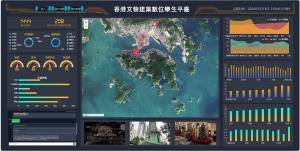HONG KONG, CHINA, May 14, 2024 /EINPresswire.com/ — Hong Kong, known for its diverse architectural heritage including temples, churches, and government buildings, is now home to the first city-level AI Digital Twin platform dedicated to heritage buildings. Developed by Dr. Zhang Jiaying, a postdoctoral researcher at the Hong Kong University of Science and Technology (HKUST), this platform aims to address the urgent need for heritage building protection in the face of increasing extreme weather events such as heavy rains and frequent fires. The platform covers all 18 districts of Hong Kong, creating a smart monitoring and protection system for heritage buildings by advancing generative AI, particularly in the integration of 3D modeling and large language models, thus enhancing the overall management and protection efficiency of Hong Kong’s heritage buildings.
Intelligent Perception and AI Modeling
The city-level heritage building monitoring network integrates satellite remote sensing, drones, the Internet of Things (IoT), and radar technologies. Using AI modeling techniques, the platform enables efficient and detailed 3D reconstruction of heritage buildings, accurately replicating their real-world scenarios. This also addresses the challenge of lightweighting complex building models, a task primarily completed by HKUST doctoral student Leung Chun Yu. This approach allows for the rapid establishment of numerous 3D models of Hong Kong’s heritage buildings within a short period and ensures the efficient future updates of these 3D records.
Integrated Digital Twin Platform
IoT technology monitors the condition of heritage buildings and the weather conditions in various locations across Hong Kong, creating a comprehensive database covering all 18 districts. For heritage preservation, the high-level data understanding of the digital twin intelligent system facilitates maintenance checks and automatic adjustments, environmental simulation, emergency warnings and decision support for weather disasters and fires, semantic indexing and querying of buildings, and energy consumption simulation and optimization.
From the city-level platform, users can access sub-platforms for individual heritage buildings. Environmental conditions, particularly air quality, and the energy consumption of individual buildings or complexes can be monitored and automatically optimized in real-time. Dr. Zhang Jiaying has developed a digital twin for the declared monument FWD HOUSE 1881 in the heart of Tsim Sha Tsui, leveraging Heritage Building Information Modeling (HBIM), Geographic Information Systems (GIS), Augmented Reality and Virtual Reality (AR/VR), IoT, Computational Fluid Dynamics (CFD), energy consumption simulation, AI, and data analytics. This project aims to improve environmental management for the preservation of heritage buildings and their contents. CFD simulations analyzed the impact of HVAC settings and layouts on the environment under different conditions, while energy simulations enhanced the accuracy and timeliness of HVAC system control, reducing energy use and carbon emissions to support the sustainable operation of heritage buildings. AI technology predicts environmental parameter changes, allowing preemptive HVAC system adjustments to mitigate damage to heritage buildings from poor air quality.
Data Retrieval and AI Intelligent Interaction
The platform uses large language models (LLM) to create interactive intelligent agents for digital heritage building models. Given the diverse eras and styles of Hong Kong’s heritage buildings, recognizing the semantics of their components can be challenging for non-experts. The digital twin intelligent agents enable users to interact and converse with the models, simply entering vague queries to highlight relevant building components and present associated information. This functionality, developed primarily by HKUST master’s student Chan Chak Fu, enhances the documentation and querying capabilities of heritage components in digital twins. Interaction with the AI language model allows for quick retrieval of historical backgrounds, architectural styles, and cultural significance of specific heritage buildings in Hong Kong.
The platform is currently available internally and not yet open to the public.
JIAYING ZHANG
The Hong Kong University of Science and Technology
jiayingzhang@ust.hk



